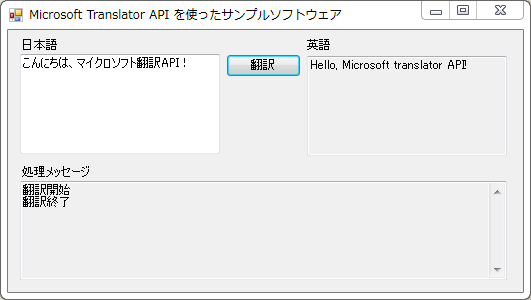Microsoft Translator API(HTTP版)を使ってみました
C#.NETで、日本語文字列を英語に翻訳してみたくなったので、少し調べてみました。そして、Microsoftが公開している翻訳API(無償プランあり)を用いて、C#.NETによる翻訳サンプルアプリケーションを作成してみたので、メモしておきます。
はじめに
翻訳APIを公開している主な会社としては、マイクロソフトとGoogleがありました(他にも私が知らないだけで有名なAPIがあるかもしれません。)どちらも以前は無料で使えていたようですが、2012/6/9現在は次の料金体系になっていました。
とりあえず触ってみたいだけだったので、Microsoftの無償プランで、サンプルアプリケーションを作成してみました。
作成したアプリケーションの画面イメージは次になります。画面左側のテキストボックスに翻訳したい日本語を入力して、翻訳ボタンを押すと、画面右側のテキストボックスに翻訳結果が表示されます。もし、Microsoft Translator APIとのやり取りに問題が発生すると、処理メッセージ欄にエラー内容が表示されます。

準備
Microsoft Translator APIを使えるようになるまでに幾つか手続きが必要でした。
- Windows Live IDの取得(既に取得済みであれば不要)
- 次のページから、Windows Azure MarketplaceでMicrosoft Translator データに対して、サブスクリプション登録を行う。
- 次のページから、自作アプリケーションを登録し、「クライアントID」と「顧客の秘密」を取得する。自作アプリケーションは未作成でも良い。
プログラム
Microsoft Translator APIとHTTP通信を行い、翻訳を行う部分だけ抜粋して、記述します。とはいえ、9割がたはマイクロソフトのサンプルソース通りなので、抜粋する意味はあまりないかもしれません。。。
using System; using System.Collections.Generic; using System.Linq; using System.Text; using System.Net; using System.IO; namespace Translator { public class TranslatorApi { private AdmAccessToken admToken; private AdmAuthentication admAuth; public TranslatorApi() { //Get Client Id and Client Secret from https://datamarket.azure.com/developer/applications/ //Refer obtaining AccessToken (http://msdn.microsoft.com/en-us/library/hh454950.aspx) // clientIDには、事前にマイクロソフトへ登録した「クライアントID」を設定。 // client secretには、事前にマイクロソフトへ登録した「顧客の秘密」を設定。 admAuth = new AdmAuthentication("clientID", "client secret"); } public string Translate(string inText) { string outText = string.Empty; string headerValue; try { // アクセストークン取得 // アクセストークンは10分間有効であるが、当アプリケーションでは簡略化のため考慮せず、 // 毎回アクセストークンを取得する。 admToken = admAuth.GetAccessToken(); // Create a header with the access_token property of the returned token headerValue = "Bearer " + admToken.access_token; // 翻訳実施 outText = TranslateMethod(headerValue, inText); } catch (WebException e) { throw new ApplicationException(GetErrorMessage(e), e); } return outText; } private string TranslateMethod(string authToken, string text) { string translation = string.Empty; string from = "ja"; string to = "en"; string uri = "http://api.microsofttranslator.com/v2/Http.svc/Translate?text=" + System.Web.HttpUtility.UrlEncode(text) + "&from=" + from + "&to=" + to; HttpWebRequest httpWebRequest = (HttpWebRequest)WebRequest.Create(uri); httpWebRequest.Headers.Add("Authorization", authToken); WebResponse response = null; try { response = httpWebRequest.GetResponse(); using (Stream stream = response.GetResponseStream()) { System.Runtime.Serialization.DataContractSerializer dcs = new System.Runtime.Serialization.DataContractSerializer(Type.GetType("System.String")); translation = (string)dcs.ReadObject(stream); } } finally { if (response != null) { response.Close(); response = null; } } return translation; } private string GetErrorMessage(WebException e) { StringBuilder sb = new StringBuilder(); sb.AppendLine(e.ToString()); // Obtain detailed error information string strResponse = string.Empty; using (HttpWebResponse response = (HttpWebResponse)e.Response) { using (Stream responseStream = response.GetResponseStream()) { using (StreamReader sr = new StreamReader(responseStream, System.Text.Encoding.ASCII)) { strResponse = sr.ReadToEnd(); } } } sb.AppendLine("Http status code=" + e.Status + ", error message=" + strResponse); return sb.ToString(); } } }
using System; using System.Collections.Generic; using System.Linq; using System.Text; using System.Net; using System.IO; using System.Web; using System.Runtime.Serialization.Json; namespace Translator { class AdmAuthentication { public static readonly string DatamarketAccessUri = "https://datamarket.accesscontrol.windows.net/v2/OAuth2-13"; private string clientId; private string cientSecret; private string request; public AdmAuthentication(string clientId, string clientSecret) { this.clientId = clientId; this.cientSecret = clientSecret; //If clientid or client secret has special characters, encode before sending request this.request = string.Format("grant_type=client_credentials&client_id={0}&client_secret={1}&scope=http://api.microsofttranslator.com", HttpUtility.UrlEncode(clientId), HttpUtility.UrlEncode(clientSecret)); } public AdmAccessToken GetAccessToken() { return HttpPost(DatamarketAccessUri, this.request); } private AdmAccessToken HttpPost(string DatamarketAccessUri, string requestDetails) { //Prepare OAuth request WebRequest webRequest = WebRequest.Create(DatamarketAccessUri); webRequest.ContentType = "application/x-www-form-urlencoded"; webRequest.Method = "POST"; byte[] bytes = Encoding.ASCII.GetBytes(requestDetails); webRequest.ContentLength = bytes.Length; using (Stream outputStream = webRequest.GetRequestStream()) { outputStream.Write(bytes, 0, bytes.Length); } using (WebResponse webResponse = webRequest.GetResponse()) { DataContractJsonSerializer serializer = new DataContractJsonSerializer(typeof(AdmAccessToken)); //Get deserialized object from JSON stream AdmAccessToken token = (AdmAccessToken)serializer.ReadObject(webResponse.GetResponseStream()); return token; } } } }
using System; using System.Collections.Generic; using System.Linq; using System.Text; using System.Runtime.Serialization; namespace Translator { [DataContract] class AdmAccessToken { [DataMember] public string access_token { get; set; } [DataMember] public string token_type { get; set; } [DataMember] public string expires_in { get; set; } [DataMember] public string scope { get; set; } } }
プログラムダウンロード
次のページからソースと実行ファイルをダウンロード出来るようにしました。もし興味がありましたら、ご覧下さい。
補足
今回は「1つの日本語テキスト」を対象に翻訳しました。マイクロソフトのページを見てみると、複数のテキストを変換するAPIがあったり、翻訳結果として音声(MP3データ)を返却してくれるAPIもあったりします。面白いことができそうですね。
動作環境
- OS : Windows 7 64bit
- .NET Framework : 3.5